Food Security in the United Arab Emirates & Opportunities for Dutch companies
Did you know that yearly 1.3 billion tons of food is wasted globally? If only one quarter of the food wasted was saved, it would feed approx. 870 million hungry people around the world. Food Consumption in the UAE is growing at an annual rate of more than 4% /year. The population is estimated to increase from 9 million to 11 million by 2030. These factors combined with the desert country having an extreme climate condition and water scarcity almost no rainfall plus a very limited water supply arable land present the government with a big challenges.
Food Security
Food Security is one of the vital topics discussed at the UAE government annual meetings. It is not just a government responsibility, yet it is the responsibility of all individuals. Teaching children where food comes from, how much of the UAE natural resources are used to grow food, how it is prepared and how valuable it is, these are really the core importance when it comes to food education for the next generation in the UAE.
Of all the waste in Dubai, food makes up 55%of it and values $ 4 billion. Therefore, the UAE is looking to find sustainable waste solutions such as composting.
The UAE imports 80% of its own food following bans in regional imports due to high levels of pesticide residue.
Water scarcity
Water scarcity is also the biggest challenge in the UAE. The UAE is one of the ten most arid countries in the world. It also consumes about 15 per cent of the water desalinated water. The UAE faces several water management challenges, including the scarcity of groundwater reserves, high salinity levels in existing groundwater, the high cost of producing drinking water, limited re-use of water, and limited collection and treatment of wastewater outsides the urban areas with water demand growing annually.
The nation’s water consumption is now a huge concern. Both alarms follow the lunch of the UAE water security strategy 2036 last September, which seeks to ensure sustainable access in normal and emergency conditions. Currently there are five international companies testing new solutions as part of the Masdar renewable energy desalination program near Ghantoot area. These projects includes solar-powered reverse osmosis, a technique where salt water is purified through membranes. Masdar has confirmed that these solutions are up to 75 per cent more energy efficient than thermal desalination technologies currently in use and capable of delivering annual energy saving of $550 million
Global innovation hub
As establishing a framework of integrated and inclusive strategy, the UAE is looking to be a global innovation hub for food security. The UAE minister for Food Security highlighted the importance of using technology, innovation, science and research to solve challenges in the UAE like food security.
Visit to NL
The UAE Minister of state for Future Food Security Mariam bint Mohamed AlMeheiry has visited the Netherlands and was amazed how a tiny country like Holland (being half the size of the UAE) uses technology to not only feed itself but also the world. She visited Unilever, Certhon, RjkZwaan, Koppertcress, Salt Farm Texel, Food Valley and Wageningen University.
A very interesting part was that first trials are being done in growing bananas in greenhouses. The Minister said that the highest consumed fruit in the UAE is bananas!
However the UAE ranks 33rd in the global Food Security Index as per the Economist Intelligence Unit. But the UAE Minister for Future Food Security announced that the UAE is strive to be among the top 10 leading countries in Food Security in 2021. Food Security for the UAE is enabling all citizens and residents of the UA to have access to healthy safe and nutritious food for an active and healthy life at affordable prices at all times!
Dubai Food Watch
Dubai Municipality has introduced new system to reduce food waste and food loss “FoodWatch”. According to the Director General of Dubai Municipality they have managed to reduce the quantity of the food destroyed yearly from 100% to 7% in 4 years to support food security in the UAE. They also created UAE Food Bank non-profit organization under the umbrella of the government committed to distribute food to those in need while eliminating food waste by collaboration with local authorities.
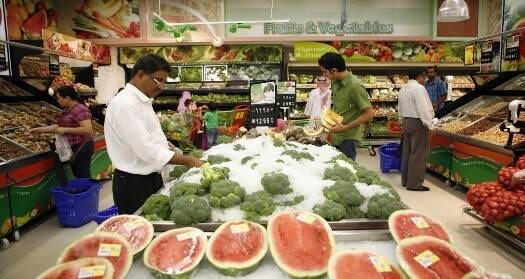
However, at least 20 per cent of all fruit and vegetables consumed in the UAE are now grown locally, and supermarkets have reported a surge in sales of locally-grown produce over the past four years. This information was revealed at the launch of a week-long event at Lulu supermarkets that seeks to boost the profile of locally-grown produce.
More than a hundred varieties — including cucumbers, tomatoes, capsicum and zucchini grown at farms across the UAE with support from the Ministry of Climate Change and Environment — are on sale at shops and markets across the country and include organic products.
The government policy is looking to increase the amount grown by 5 to 10 per cent a year. The initiative will boost food security, ensure farmers get a bigger slice of the profits by removing middlemen and will lead to sustainable use of vital water supplies.
Some farmers are embracing hydroponics, a more efficient system of agriculture that does not need soil, to cut their water use by up to 70 per cent, officials said. There are least 200 hydroponic farms in the UAE now and the ministry is helping those who want to try these techniques.
Major supermarket chains are also reporting a surge in sales. Lulu said that it sold close to Dh4m (€952,000) worth of organic, locally-grown produce during 2018 — a five per cent increase on 2017. This represents about 10 per cent of all organic fruit and vegetables sold at its chains here — up from about three per cent a few years ago.
The Date Palm production is one of the important priorities within the framework of the UAE national Future Food Security Strategy. Climatically, the country is divided into two ecological zones which greatly influence the agricultural production: These are the coastal region with hot and humid summers and warm winters, and the inland region which is more dryer. The potentialities of a commercial date production industry in UAE were realized many years ago.
Palm trees cover over 100 million sq meter in the UAE. The UAE produces about 172.000 tons of dates per day according to 2016 statistics.
The Red Palm Weevil (RPW), Rhynchophorus ferrugineus Olive is considered a major pest of the date palm in the Middle East where it causes severe damage.
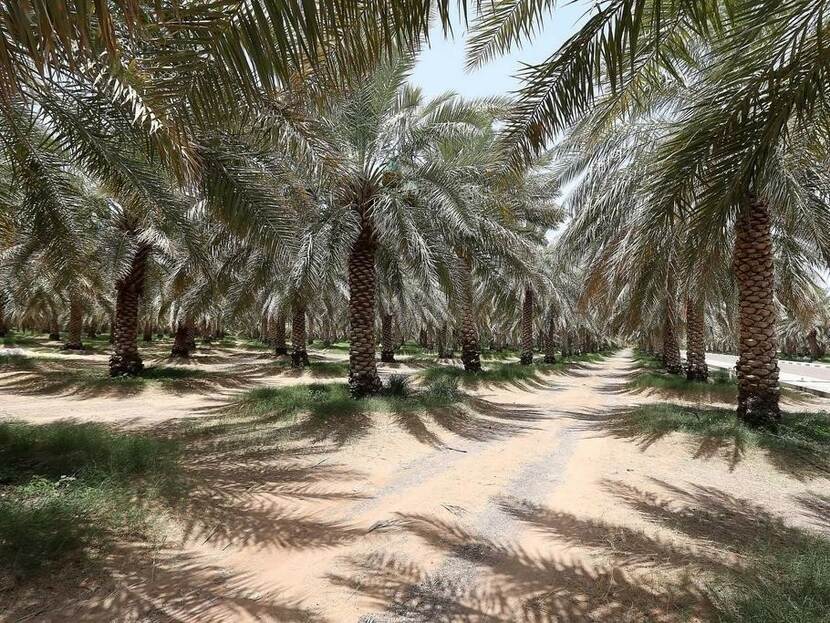
The Farm House in the Emirates of Ras Al Khaimah with an area of 40.000 Square meters facility produces around 3,500 Kg of tomatoes a day!
The Farmhouse uses innovative farming technologies to deliver fresh, locally-grown pesticide free vegetables to the UAE
Getting fresh produce year-round is a challenge here in the UAE with the hot desert climate. Regionally grown produce often uses pesticides and cannot always be delivered during the summer months, while naturally grown vegetables imported from around the world come with a high price tag and spend up to 14 days in transit, losing their freshness.
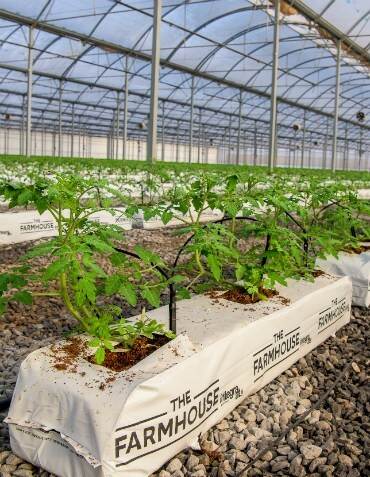
The UAE grows mushrooms in a closed environment agriculture system. The two largest producers of mushrooms in the UAE are Mirac and Eco Fresh in the Emirates to Ras Al Khaimah. They produce 5.000 kg a day. The mushroom varieties include Portobello, Oyster mushroom, White bottom mushroom and Brown mushroom.
Eco-Fresh has trained their farmers to grow mushroom in the Netherlands for the adaptation of advanced agriculture technology in the UAE.
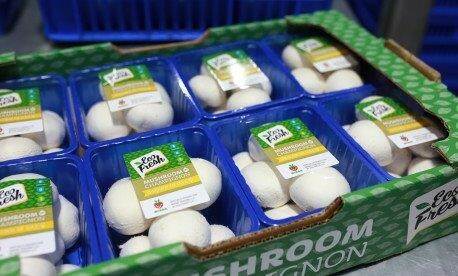
Camel milk: Camelicious Farm in Dubai is a camel milking state-of-the-art facility that produces 9000 liters of premium camel milk daily. They export their products to the Netherlands.
They have over 40 different types of products varying from camel milk with different flavors to camel milk ice-creams, camel milk protein bars and even camel milk shampoos (paraben and sulphate free)
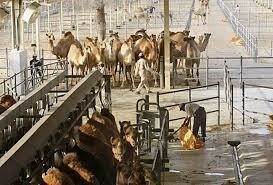
Do you know the camel milk has up to 5 times more vitamin C than cow’s milk!
AlDahra Holding has taken huge steps in securing the UAE’s food security. It is considered as one of the UAE government strategic partners. An MOU has been signed between the UAE government and AlDahrah to enhance the partnership further by working together to boost market awareness and intelligence.
The UAE company AlDahra Holding acquired recently 57.000 hectares of farmland on an island called Braila in Romania used for advanced agri technologies. It is the biggest farm in Europe.
Another example of UAE projects to enhance global food security is apple farm in Serbia with over 500,000 apple trees, this apple orchard spreads over 130 hectares and produces 70,000 tons of apple per year.
Al Dahra-Baywa greenhouses facility in Al-Ain is a perfect of adaptation of Dutch advanced technologies adapted to the UAE’s environment by a group of Dutch companies: Van der Hoeven, Patron Agri Systems, VEK Adviesgroepe, Van Dijk Heating, Royal Brinkman, Natupol, Grodan Delta, Omniplast.
It will produces 3,000,000 kg of clean tomatoes annually whereby water is recycled to 100%.
Pure Harvest Farm is in the middle of the desert in the United Arab Emirates, tomatoes are grown with Dutch innovation. Pure Harvest aims to be part of the solution to the region’s growing food security, water conservation, and sustainability challenges.
Total 7 Dutch companies are involved :Certhon Greenhouse Solutions, Priva, Koppert Biological Systems, Hatenboer Water, Royal Brinkman, RijkZwaan.
Pure Harvest Smart Farms is the embodiment of the water-food-energy Nexus. As a local start-up, it expresses the vision of the Netherlands of sustainability through innovation.
In such an arid harsh climate, while constantly battling with a limited water supply, it is essential that innovations such as controlled climate growing facilities are utilized in order to maximize food sources. Pure Harvest plans to develop a portfolio of CEA (controlled environment agriculture) technologies including vertical farms and contained based growing locations to help battle water and food scarcity and provide a wide range of fresh produce.
The Dutch high-tech of Certhon used at Pure Harvest enabled approach to arid climate agriculture and its strong project team offers a realistic and much-needed solution for improving food security across the Gulf.
The GCC’s first commercial vertical indoor farm, Badia Farms, uses the latest hydroponic technology and vertical farming techniques, the farm produces nutritious and pesticide-free leafy greens without the need for sunlight, soil or chemicals. The farm produces an extensive range of micro-greens and baby leaf herb varieties. Badia Farms uses high-tech indoor farming techniques that allow crops to grow throughout the year. The sustainable eco-system created at Badia Farms uses 90% less water than in open field farming.
A ‘Food Valley’, or a technology hub, dedicated to the development of food and farming automation, is set to be built in the UAE. The project aims to address the country’s rapid population growth and increasing food consumption rate of 4 percent per year. These factors, combined with the UAE’s inhospitable desert environment, present the government with an agricultural challenge.
The UAE aims to develop new technologies that would enable it to grow more food despite its desert landscape. The idea comes from the Food Valley in The Netherlands, where you have technologies, or start-ups, sprouting and developing into commercial giants.
Today, fresh and non-perishable produce from foreign shores accounts for up to 90 percent of the country’s food. To reduce this reliance on imports, the UAE’s focus is shifting towards developing local agriculture, and with new technologies.
The question remains, however, whether the UAE’s hi-tech local produce will be able to compete in price terms with cheaper overseas imports in the supermarkets?
The UAE currently imports up to 90% of the food consumed by its population. Will local produce be able to compete with cheaper overseas imports?
The Minister of Food Security hopes that residents in the emirates will be willing to pay a slight premium for locally grown fruit and vegetables, arguing that they have travelled a shorter distance and are more nutritious.
January 2019
By Samar Kadri – GCC Agro Team - Dubai
Senior Policy Advisor – Agriculture & Food